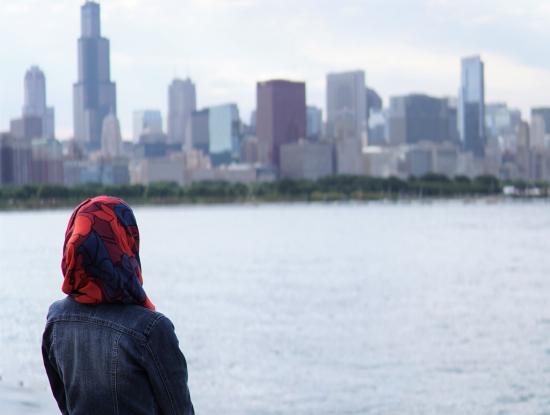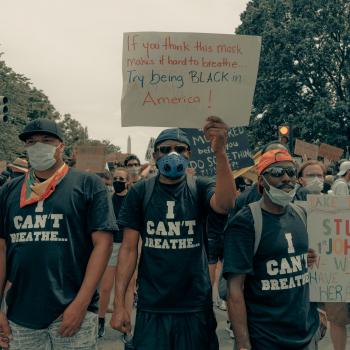“You’re not wearing the hijab properly. Women who dress like that are cursed.”
“Sister, you are misleading the younger generation of Muslimahs.”
“You shouldn’t bother wearing the hijab at all if you are going to wear makeup/tight clothes.”
“You are representing Islam in a bad way when you wear the hijab like that.”

…Sound familiar? It does to me. Thankfully, I haven’t had anyone comment on my own hijab. But I see other Muslim women getting these kinds of comments on a daily basis, not just from other women but often from men.
There is absolutely no reason for random men to give their unwarranted two cents about the way a Muslim woman covers her body. As someone who wears a hijab/headscarf, I’m going to be addressing that aspect of it, specifically.
Most of the time when men give women advice about hijab these days, they do it online on a public platform (which goes against the Islamic etiquette of giving advice). I have seen YouTube videos from Muslim men where all they talk about is how a Muslim woman should cover or the mistakes that many women make, as if there are not other resources out there on this topic. There are videos of men bashing Muslim women for wearing “improper” hijab and being YouTubers. Men criticizing a Muslim woman’s makeup, outfit, or style of hijab on Facebook, Instagram, YouTube, etc. in the name of “guidance.” This is not sincere advice. This is an attempt to humiliate and control these women.
And then there’s the pathetic argument that if a woman is not practicing hijab perfectly, she shouldn’t be wearing a headscarf at all. Besides the fact that these men are bringing the sin on themselves if the woman actually does remove it as a result of this discouragement, it also just doesn’t make sense. That’s like saying if someone isn’t praying 5 times a day or isn’t praying perfectly, they should just stop completely.
This is not sincere advice. This is an attempt to humiliate and control these women.
Some men say the hijab is a big deal because Muslim women are representing Islam, so if they do something wrong while wearing it, it’s worse than if they were not wearing it while doing that action. But why should the burden of “representation” fall solely on hijabi women’s shoulders? And what about a man who’s sinning? For example, if a man is dating and he is with his girlfriend, should he not pray in front of her because she’ll associate his actions with Islam and think dating is okay in our religion? No, because obviously, one sin doesn’t excuse another. Plus, if someone genuinely wants to learn about Islam, they will learn right from wrong through research regardless of what Muslims are doing.
There’s also an impossibly high standard that Muslim women are held to when they wear the hijab, versus when they don’t. I haven’t been wearing the hijab for most of my life, so I know this is true. As soon as a woman starts wearing a scarf on her head, people (including Muslim men) expect her to be a perfect Muslim. The hijab is not a statement saying, “I’m a perfect Muslim! Be like me!” It’s a sign of a woman’s attempt to draw closer to her Creator through obeying Him. The hijab on my head has literally nothing to do with other people. I’m not doing it to hide from men. I’m not doing it to become a role model for young Muslimahs. I’m not doing it to prove a point to society. The only thing that keeps me wearing the hijab every day, despite all of the struggles it comes with, is my desire to please God. That’s it.
Muslim men are supposed to be a source of support for their sisters-in-Islam. They are supposed to be the people who try to understand our struggles with the most empathy at a time when it seems like nobody on the outside does.
What bothers me more than anything about this issue is that Muslim men have no idea what the women they are criticizing are going through. This is why they’re coming from a place of judgment rather than empathy. The majority of the guys who are finding fault with women’s hijab are wearing skinny jeans and muscle shirts, as if “hijab” just means headscarf, and modesty is only for women. They have short, meticulously-shaped beards and post pictures of their flexed muscles online. They go out in public looking like brown hipsters, not targets of Islamophobia. Hijabi women, on the other hand, have to face multiple types of pressure: scrutiny from Muslims, societal pressure to look a certain way, and fear/anxiety about being the target of hateful comments and even physical violence. Women who wear hijab cannot be understood by men who throw on jeans and a t-shirt and walk around nonchalantly in public. It’s easy to point fingers and accuse women of not wearing “proper hijab,” and a lot harder — no, impossible — to walk a mile in their shoes. Where is the compassion?
I’m not saying there is no place for advice. But that advice needs to come from a place of kindness, empathy, and gentleness. Don’t advise someone about how to wear the hijab if you don’t know them or they don’t trust you — they have other people in their life for that, I promise. Don’t advise a woman about her hijab if you know nothing about the state of her faith. Don’t even advise a family member about it unless it’s someone you have a good relationship with and you are doing it privately, compassionately, and sincerely.
Also, I would never walk up to a Muslim man who is dressed inappropriately or immodestly and correct him myself, even if it’s with the intention of “advising” him. Because I know that that’s not my job. My responsibility is to lower my gaze if I see something I should not be looking at, and it’s the task of other men who are close to him to kindly guide him in the right direction over time.
It’s easy to point fingers and accuse women of not wearing “proper hijab,” and a lot harder — no, impossible — to walk a mile in their shoes. Where is the compassion?
Muslim men are supposed to be a source of support for their sisters-in-Islam. They are supposed to be the people who try to understand our struggles with the most empathy at a time when it seems like nobody on the outside does. They are our brothers in faith, after all. I know that I would never expect my biological brothers to publicly criticize me verbally or online, make YouTube videos talking about my flaws, or expect me to quit practicing my faith (or parts of it) altogether if I’m not perfect. If they did any of that, I would wonder if they truly had my best interest at heart.
“Tell the believing men to lower their gaze and guard their private parts. That is purer for them. Indeed, Allah is well-acquainted with what they do.” [Qur’an 24:30]
“And by the Mercy of Allah, you dealt with them gently. Had you been severe and harshhearted, they would have broken away from about you; so pass over (their faults), and ask (Allah’s) Forgiveness for them; and consult them in the affairs.” [Qur’an 3:159]












